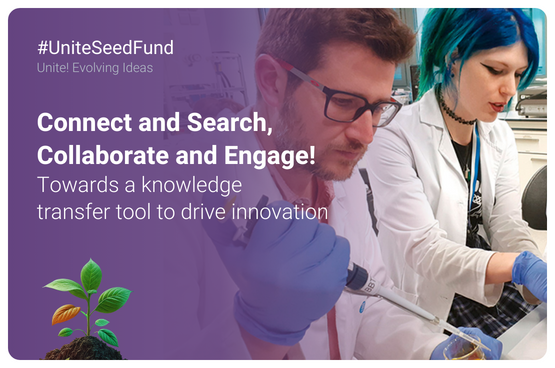
Unite! is working on the adoption of a knowledge graph to accelerate its growth in R&I
The aim of the project, which involves large and medium-sized enterprises such as MERCK and Empolis, is to strengthen the links between the academic world and the business environment
Connect and Search, Collaborate and Engage! Unite! has been
working to strengthen the ties between academia and the business sector. With
this goal in mind, Unite! will create a
knowledge graph tool that unveils the vast potential for research and
innovation. This tool will expedite collaboration with companies, civil society,
industry, and administrations—essentially, all potential partners for research
and university teaching. Spearheaded by the Universitat Politècnica de
Catalunya · Barcelona Tech (UPC), the Unite! expert community focused on
reinforcing academia and business cooperation is driving this initiative
within the Unite! H2020 project, which has also received funding by the Unite!
Seed Fund.
The first step will be to evaluate this cutting-edge tool, in collaboration with six Unite! universities and two associate members. This tool aims to showcase the alliance's areas of knowledge, fostering improvements in partnerships, projects, and knowledge exchange with the broader community. The resulting data graph will encompass information on universities, researchers, clusters, publications, personal experiences, patents, spin-offs, start-ups, research projects, technology partners, and more.
Our challenge is to identify and transfer our research, innovation and doctoral activity, whether it be knowledge, scientific ideas, technologies, and to make our talents visible to our partners: civil society, companies, industry, administrations.
The tool, set to unfold in the next few years under the Erasmus+ project, has recognized the necessity of establishing a Technology Transfer Office (TTO) within Unite! It also acknowledges the value that collaboration with Unite! research and innovation communities can bring to potential partners across the nine universities. This implies that partners within the Unite! community benefit from a heightened level of trust, making connections and recommendations more impactful. Professor Bordonau emphasizes that once we can easily visualize our areas of expertise and research clusters, it becomes simpler and faster to find partners for various projects, ranging from applied research to innovation cooperation.
The community of experts working on the tool has identified a collaboration opportunity resulting from TUDa's robust collaboration with pharmaceutical company MERCK. MERCK was seeking a potent tool to visualize and analyse its global knowledge, leading to the development of a graphical software. The Unite! working group recognizes this software as a promising tool for innovation and value creation, subsequently licensing it to Empolis, an SME based in Darmstadt.
This initiative, presented as a Unite! Seed Fund project proposal, is expected to last approximately 8 months as an exploratory pilot project. The primary focus will be on evaluating the Knowledge Graph tool and its interfaces with existing systems and databases at Unite! universities. Additionally, there are plans to develop guidelines for the introduction, use, and dissemination of data by both universities and the community (including research fields and scientists/researchers). The project also aims to assess the integration of the new interface in Metacampus and Agora and conduct tests with involved parties, including universities and partners.
Following five brief workshops with Merck and Empolis GmbH, involving heads from UPC, KTH, and TUDa, the project has gained financial support from the Alliance's Seed Fund. Furthermore, Merck will contribute its expertise on the tool, while Empolis will be responsible for evaluating the interface.

